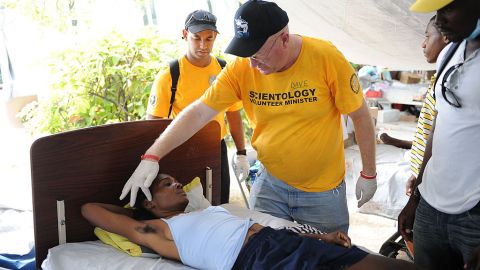The Insidious Nature of Scientology’s Outreach Programs

The IDEA World Fitness Convention is the country’s largest annual gathering of instructors, personalities, and products in the fitness industry. You attend to check out the touring circuit of top professionals as well as educate yourself on groundbreaking ideas and platforms in the exercise world. So it was rather surprising to find Scientology manning a booth at the downtown Los Angeles convention in the summer of 2015.
There’s plenty of pseudoscience and nonsensical trends at these conventions, such as the notion that chocolate milk and juice cleanses are healthy and the idea that hand weights in an indoor cycling class is anything but a biomechanical nightmare. Players in the fitness industry maximize profits wherever possible regardless of ethical, anatomical, and physiological missteps. Lack of oversight in this industry is rampant.
But the fact that the convention itself took money from a program that preaches spirits—thetans—heal injuries and illness is beyond bad form. Scientology’s booth, Nerve Assists, featured a woman practicing some sort of massage, armed with the cult’s infamous E-meter and copies of Dianetics. L. Ron Hubbard’s Assist programs are not only applicable to the living; such touch and vocal commands, barked in boot camp style glossolalia, is marketed as bringing dead bodies back to life as well.
This program, advertised at IDEA as ‘Scientology Solutions for Athletes,’ is but one of the many crafty ways the cult embeds itself in seemingly helpful industries in attempts of winning converts. Given the many lumps the organization has taken since the proliferation of the Internet, church leaders have spread its wings far and wide to save face. Nerve Assists is just one of its many programs.
Others include Criminon, a non-profit prisoner rehabilitation program. While this business has been criticized for recruitment and shady techniques, the state of New Mexico once dumped $375,000 to an offshoot called Second Chance, which, among other things, made inmates spend four hours a day in a cedar sauna while ingesting niacin, vitamin B, and an olive oil chaser. As details of the program reached the public the government quickly cut off funding.
Then there’s Narconon. William C. Benitez used Hubbard’s The Fundamentals of Thought when founding this organization in 1966. Hubbard approved; four years later Narconon was an official offshoot, though the founders claim the organizations are separate. Numerous former patients and state officials disagree. A short list of grievances includes:
Recent lawsuits in California, Nevada, and Oklahoma, combined with organizational trouble in Quebec, Russia, Spain, and Kazakhstan, have kept authorities and potential clients suspicious. In each of these cases money problems and proselytizing go hand in hand. The “studies” that Narconon relies on to promote its services are tremendous, mostly because they’re falsified. This Scientology offshoot, like others, proves that fruit never falls far from its tree.
Narconon has spun off numerous other groups to shield Scientology’s involvement, including Blue by the Sea, Fresh Start, Israel Says No to Drugs, and Sober Living in Orange County. Addiction to drugs and addiction to ideologies both involve neurochemistry; both exploit patterns of behavior; both create new identities that tend to be abrasive and dangerous.
Alcohol might destroy livers, but the notion that you must confront and merge with your thetan comes with its own attendant problems, including neurosis, depression, anxiety, and a gullibility that permits all sorts of errant behavior. For better and worse, charitable arms of religious organizations spread their messages under disguise of service. Such initiatives work best when faith is invisible. In the case of Scientology’s long reach of training routines, the cult has proven itself little more than an insidious mocking of charity.
—
Derek Beres is working on his new book, Whole Motion: Training Your Brain and Body For Optimal Health (Carrel/Skyhorse, Spring 2017). He is based in Los Angeles. Stay in touch on Facebook and Twitter.





